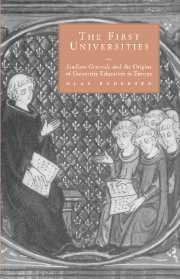Book contents
- Frontmatter
- Contents
- Preface
- Preface to the English edition
- List of abbreviations
- 1 The classical inheritance
- 2 From ancient science to monastic learning
- 3 The Carolingian Renaissance
- 4 The schools of the middle ages
- 5 From school to studium generale
- 6 The battle for the universities
- 7 Structure and form of government
- 8 The material situation
- 9 The road to degrees
- 10 Curricula and intellectual trends
- Index of names
2 - From ancient science to monastic learning
Published online by Cambridge University Press: 03 November 2009
- Frontmatter
- Contents
- Preface
- Preface to the English edition
- List of abbreviations
- 1 The classical inheritance
- 2 From ancient science to monastic learning
- 3 The Carolingian Renaissance
- 4 The schools of the middle ages
- 5 From school to studium generale
- 6 The battle for the universities
- 7 Structure and form of government
- 8 The material situation
- 9 The road to degrees
- 10 Curricula and intellectual trends
- Index of names
Summary
Historians of earlier times were fond of talking about the collapse of ancient culture, its slumber during the dark ages, and its resurrection in the Renaissance. Yet the more detailed our knowledge of its historical development has grown, the more this popular and heavyhanded construction has proved to be increasingly meaningless and unsuitable. The sharp distinction between the ancient and medieval worlds is becoming unclear and arbitrary, and the darkness of the middle ages now appears to a certain extent to be due to the weak light by which it used to be seen. Today the picture is far more varied. No-one wishes to deny that the Roman empire perished as a political unity. But whether its fall also involved the annihilation of ancient culture is a far more complicated question. On the one hand it is incontestable that very significant changes were taking place in the period around the years 400 to 600 in political, economic, and intellectual terms. On the other hand we catch a glimpse of a significantly greater continuity in development than is immediately apparent if our attention is only fixed on conspicuous events, as for example the triumph of Christianity or the disintegration of the Roman empire. Clearly there is no place in this chapter for more than a schematic treatment of all these changes, the common context of which is far from being explained in an historically exhaustive way. So we must be content with nothing some of the events that had immediate consequences for the intellectual and academic situation of posterity.
- Type
- Chapter
- Information
- The First UniversitiesStudium Generale and the Origins of University Education in Europe, pp. 29 - 66Publisher: Cambridge University PressPrint publication year: 1998



